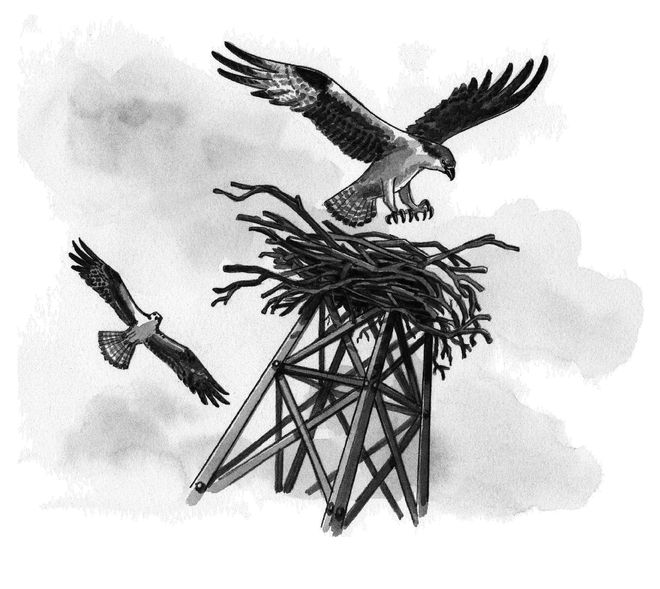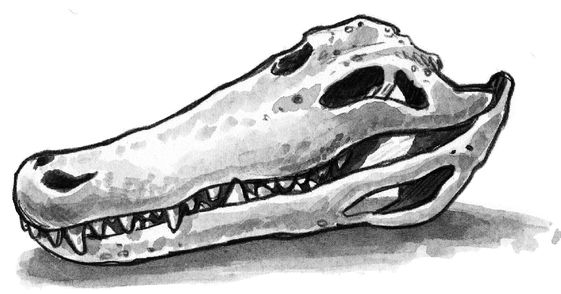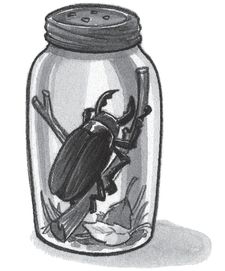Your Backyard Is Wild (2 page)
Read Your Backyard Is Wild Online
Authors: Jeff Corwin
Benjamin did a quick calculation. If his dad took the camera and collecting jars, he could do without the duffel bag. He would still get to bring one suitcase—the piece of checked luggage—plus his backpack as a carry-on. So he could still bring his other stuff, tucked safely under a sweatshirt in his suitcase. He needed it just in case.
By noon, the Baxters were sitting on a hot, cramped plane. They had been there for almost two hours already, and the plane still hadn’t left the airport. Daisy would have hated this, thought Benjamin. He wasn’t having much fun himself.
He had already eaten all the snacks he’d packed. He didn’t want to run down the batteries on his MP3 player. And he was saving his books—two mysteries—for when they were really in the air. There was only one thing to do, then. Benjamin bent down, unzipped the backpack he’d stowed under the seat in front of him, and took out his binoculars. He always looked for animals when he was bored.
Lucy looked over and shook her head. “We’re in the airport!” she reminded him.
“You never know what’s out there,” said Benjamin. He scanned the run-way from the tiny plane window.
Benjamin could see baggage carriers and airport workers. He could see a line of planes ahead of theirs, waiting to take off. But it didn’t take him very long to find something else.
He handed Lucy the binoculars and pointed. “Look at that radio tower,” he said. “See the pile of sticks on top? I think that’s an osprey’s nest.”

The heap of sticks looked round and even. And just as the kids were watching, a huge bird swooped into it! Even from this distance, Benjamin could tell it was an osprey by the dark mask over its face. It looked almost like a raccoon, if you ignored its five-foot wingspan. “Cool!” he said. It was the last thing he’d expected to see here.
“Let me see,” their mom said excitedly, leaning across the aisle. “You know, ospreys will build their nests anywhere, so long as they’re near a source of fish.” She took the binoculars and looked in the direction he was pointing. “Yes, Benjamin, you’re right!”
Would Gabe know an osprey nest if he saw one? Benjamin wondered. And would he be excited about it? The last time he’d seen Gabe, they’d both been five years old, in kindergarten. He hardly remembered him, except that he had dark, curly hair and a big smile.
His mom and Gabe’s mom were sisters, but they lived very different lives. Benjamin worried that he and Gabe might be really different, too. What if they didn’t have a good time together?
Impossible, he thought as he remembered the extra stuff he’d packed in his suitcase. First there was his rock collection—or the best rocks from his collection, really, since bringing all of them would have been too heavy. He had pieces of quartz and crystal from family exploring trips, plus smooth rocks and sharp rocks he’d found around their neighborhood. A city kid should like rocks, Benjamin thought, since you can find rocks anywhere. His collection would give him and Gabe something to talk about.
And if Gabe wasn’t into rocks, Benjamin was sure he’d want to see his alligator skull! It was cast from the skull of a real alligator that his mom had in her lab. It had two rows of razor-sharp teeth and a jaw that was hinged so it could open and close. People said that alligators lived in New York’s sewers, but Benjamin was pretty sure his cousin had never seen one up close, like Benjamin had in the Everglades. It was a surefire conversation starter.

Benjamin felt better knowing that some of his treasures were coming along for the trip. Maybe, while he was learning about New York, Benjamin could also teach Gabe a thing or two about where he comes from.
Chapter Two

A
few hours later, as the Baxters’ plane circled above New York City preparing to land, Benjamin caught a glimpse of the famous skyline shining in the afternoon sun. It was just as he’d imagined it, only better, and he couldn’t wait to see it up close! In the airport, it felt like his family waited forever for the suitcases to appear on the carousel and their turn in the taxi line to come up.
few hours later, as the Baxters’ plane circled above New York City preparing to land, Benjamin caught a glimpse of the famous skyline shining in the afternoon sun. It was just as he’d imagined it, only better, and he couldn’t wait to see it up close! In the airport, it felt like his family waited forever for the suitcases to appear on the carousel and their turn in the taxi line to come up.
Finally, they were on their way to Gabe’s house. Their cab sped along the edge of the city, and Benjamin craned his neck so he could see the tops of the buildings as they zipped by.
Suddenly Lucy was practically in his lap, trying to see for herself. “Hey, that’s my arm!” Benjamin complained. “You’re crushing me!”
He could see why she didn’t want to miss anything, though. The sky-scrapers were tall—he’d expected that. But there were so many of them! And where there weren’t buildings, there were cars in traffic. Or crowds of people waiting to cross the street. The city reminded Benjamin of an ant colony. It was busy and social, like that. But much bigger, of course.
He leaned down for his backpack again, this time to take out his notebook. “Field notes,” he explained to Lucy when he saw her looking over. Their family always took notes when they were seeing something new. Real scientists tried to describe a thing carefully so they’d remember what it looked like even when they left it behind. Benjamin was sure he would
never
forget seeing New York for the first time, but he took the notes out of habit.
never
forget seeing New York for the first time, but he took the notes out of habit.
The taxi turned, then inched down an off-ramp. Suddenly they were on the Brooklyn Bridge! Gabe and his parents lived in Brooklyn, one of the city’s five boroughs, so the Baxters had to be getting closer.
Benjamin rolled down his window and stuck his head out to see the bridge’s famous archways. There were ferryboats and sailboats way down below, on the East River. Benjamin glanced at a map posted in the cab. It showed that this river fed into New York Harbor at the tip of Manhattan, just a short distance from where the bridge stood. From there, it wasn’t very far to the open ocean.
The cab came off the bridge and turned onto a side street. It was quieter here, with trees lining the sidewalks. And soon they pulled in front of a building with wide steps leading up to the front door.
Benjamin saw a blur shoot out the doorway, down the stairs, and onto the sidewalk. It was Gabe! He looked a lot older but otherwise just the same as Benjamin remembered him.
Soon Gabe’s parents, Aunt Lily and Uncle Peter, were out on the sidewalk, too. Benjamin’s mom and Aunt Lily gave each other a huge, sisterly hug, and the grown-ups told all the kids how big they’d grown. It was the first time they’d all been together in years. Benjamin was a little nervous and didn’t know what to say to anyone.
When the conversation turned to the details of the trip, Gabe looked at Lucy and Benjamin and grimaced. “Want to see my room?” he asked. It was as if he’d just seen his cousins yesterday.
Benjamin grinned. “Let’s skip this boring stuff,” he said. Suddenly he wasn’t nervous at all.
He and Lucy followed Gabe into the building. It was a long walk up to the fifth floor, where Gabe lived. “I thought New Yorkers had elevators,” Benjamin said, a little out of breath.
“Some do,” said Gabe. “But this building is called a walk-up. It means, you know, that you walk up!”
Gabe’s place wasn’t at all like the fancy New York apartments Benjamin had seen in books and TV shows. It looked comfortable, like their house at home, with a sunny living room and a cozy kitchen. There were family pictures on the walls, and Gabe’s artwork on the fridge.
“My room is right in here,” Gabe said, opening a door. It was small and crowded with stuff. “Want to see my collection?”
Benjamin could hardly believe his ears. He and Gabe were both nine—and they both collected stuff! “Sure. I brought a collection, too!” he said. When his sister looked at him and rolled her eyes, Benjamin shrugged.
Gabe opened a drawer and took out six stacks of baseball cards, each secured with a rubber band. “I collect Yankees cards,” he said. “Look at this one . . . it’s Derek Jeter as a rookie.”
The kids pored over the cards until Gabe realized one of them was missing. “Hold on,” he said. “I just had it. . . . Maybe it’s over here. . . .” While Gabe rummaged around his room, Benjamin took a look out the window. It faced the back of the apartment building. He could see a lot of sky and even a sliver of water. Directly below him was a patch of green.
“Hey, Gabe—what’s that?” he asked.
“The backyard,” said Gabe.
“A backyard!” cried Lucy. “In New York?
“Can we see?” asked Benjamin. He thought no one had those here. He couldn’t wait to tell the kids back home!
“Sure,” Gabe said agreeably. “Hang on a sec.” He put the cards away carefully and led them back to the stairs. They went all the way down to the basement, which was dark and dusty and filled with old bikes. They passed a laundry room, and in the back there was a door that was supposed to lead outside. When Gabe pushed it, though, it was locked.
“Is there a key?” Benjamin asked. He really wanted to see the yard.
“Well . . . yeah. Somewhere. But I don’t know who has it. Nobody really goes out there,” he explained. “My mom says it’s because nobody wants to cut the grass.”
Benjamin met his sister’s eye for a minute. He knew they were thinking the same thing. This was definitely one way that life in New York was different from life back home. In Florida, people spent as much time outside as they could. And they definitely didn’t mind mowing a little grass!
Soon they were back in Gabe’s room. “So . . . let’s talk about what we’re going to do this week!” Benjamin said, making red Xs on a subway map next to all the sights they wanted to see. The Statue of Liberty. The Empire State Building. The mummies at the Metropolitan Museum. A baseball game, if they could get tickets. They couldn’t do everything, but Benjamin was determined to squeeze in as much as he could.
Later that day, the Baxter kids and Gabe trailed behind their parents on a long walk through Brooklyn. Uncle Peter told the adults all about the history of the neighborhood. It was called Brooklyn Heights, and at one time it had been a suburb of New York. Now it was officially a part of the city, but it still had a quiet, old-fashioned character that set it apart.
“People like to live here,” Uncle Peter said, “because it’s only a short subway ride from here to downtown Manhattan. People also like the shady streets, and the smaller buildings, called brownstones because of the brown stone they’re made from.”
As his father continued talking to Benjamin’s parents, Gabe gave his cousins his own tour. “Here’s my school,” he said, pointing at a brick building with a big basketball court. “Here’s where my best friend lives,” he noted when they passed an apartment tower. “And
this
is the best place to get ice cream.”
this
is the best place to get ice cream.”
Uncle Peter agreed. He ordered cones for the whole family, and they carried them to a path along the East River called the Promenade, where people could walk and see the skyline of lower Manhattan. After they walked for a while, Benjamin realized that the Promenade was a sort of park. But it wasn’t like the parks he knew back home. That was what made it interesting.
Lucy and Benjamin posed for pictures until Benjamin said, “My ice cream is melting! Can we take a break now?” The kids sat on a bench a short distance away from their parents, right beside a playground.
Other books
A Question of Ghosts by Cate Culpepper
The Cost of Lunch, Etc. by Marge Piercy
The Lost Souls' Reunion by Suzanne Power
Antiques St. Nicked by Barbara Allan
Grace Under Fire by Jackie Barbosa
Final Solstice by David Sakmyster
Discovering Sophie by Anderson, Cindy Roland
The Italians by John Hooper
The Torso in the Canal by John Mooney
Chain Reaction by Diane Fanning